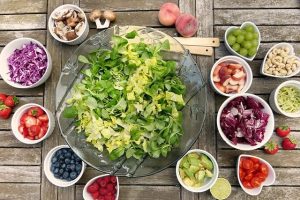In these difficult (and expensive) times, food storage is important. We’ve discussed several options for wheat and grain storage. We’ve also discussed organizing our pantry and fridge. Let’s discuss how to store your produce
 When it comes to fresh produce, the biggest concern is how to store it in order to keep it fresh for as long as possible. Each different type of fruit and vegetable has different recommendations as far as how it is stored. When you understand a little more about proper storage, you will be able to reduce waste and have the best tasting fruits and veggies possible.
When it comes to fresh produce, the biggest concern is how to store it in order to keep it fresh for as long as possible. Each different type of fruit and vegetable has different recommendations as far as how it is stored. When you understand a little more about proper storage, you will be able to reduce waste and have the best tasting fruits and veggies possible.
Know Your Ethylene Produce
There are some fruits that give off a gas called ethylene, which is naturally produced from ripening fruit. You probably have not noticed it much, except when other fruits or vegetables tend to spoil more rapidly if an ethylene-producing fruit is stored near it. Some produce that give off this gas include:
- Bananas
- Cantaloupe
- Apples
- Avocados
- Honeydew
If you keep these fruits near foods that are sensitive to it, they might spoil a lot faster, which is why it is important to know what they are. The fruits and veggies that are sensitive to ethylene include:
- Lettuce
- Broccoli
- Potatoes
- Cabbage
What to Store in the Refrigerator
Let’s start with produce that does best when stored in cooler temperatures in the refrigerator. While most of these can also be stored at room temperature, they won’t fair nearly as well as likely spoil before you get a chance to consume them. Produce that does better in the refrigerator, include:
- Berries
- Apples
- Asparagus
- Grapes
- Cherries
- Carrots
- Bell peppers
- Lettuce and greens
What to Store at Room Temperature
There are also some types of produce that actually do better when they are stored at room temperature. This doesn’t mean you can’t put them in the refrigerator, but it is often not necessary. This includes:
Melons, like cantaloupe and watermelon
Bananas
Avocados
Mangoes
Peaches
Pears
Pineapple
Potatoes
Quick Tip for Storing Greens
When it comes to storing your fresh greens, including lettuce and leafy greens like spinach and kale, you want to make sure you reduce moisture as much as possible. The moisture is what is going to cause it to spoil more quickly. If you are rinsing it before storing, use a salad spinner first to remove excess water, then place it in a bag or storage container lined with paper towels. Those will soak up any remaining excess moisture, and help it to last a little longer.
Sometimes, it is about experimenting and see how your produce does when stored in various ways.
Related Content
Auto Amazon Links: No products found.




